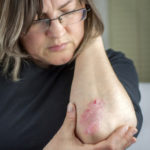 Psoriasis and Heart Disease
Psoriasis and Heart Disease
The first time I became aware of the skin condition, psoriasis, I was at the beach. As a young teenager, it was difficult for me not to stare at the raised, pink, scaly lesions that covered this sunbather’s body. It looked to be so very uncomfortable—not to mention unsightly.
When I discretely asked a friend of that poor “skin sufferer” what type of skin condition he had, I was told it was psoriasis. Since then I have come across many people afflicted with the same condition: friends, patients, and even some of my young college students.
Psoriasis is an auto-immune disease which speeds up the formation of skin cells leading to the scaly patchwork of lesions that are most predominantly found on the scalp, knees, elbows, and lower back.
Living with this disease is no walk in the park. Those skin patches are inflamed, tender, and itchy! Psoriasis is, unfortunately, a lifelong disease which, while it can be managed, cannot be cured.
Recently my daughter, who is in medical school, told me of a correlation between psoriasis and heart disease that I was unaware of: Persons with psoriasis have a 3x greater risk for heart disease than those who do not have this condition. This significantly increased risk of vascular problems included heart attacks, strokes, and, particularly for those with psoriatic arthritis— coronary arrhythmias*.
The connection between the two diseases lies in the inflammatory nature of psoriasis. When the body is in a state of inflammation, so is the inner lining of one’s blood vessels. Inflamed vessels over-react to scratches they get when red blood cells and circulating fats (i.e. LDLs) scrape by during circulation. These minor injuries lead to excessive plaque formation (atherosclerosis).
So what’s the good news here? It’s this: Knowing that you are at increased risk, you can get serious about improving your heart health so you don’t become “a statistic”. Lose weight, if need be, exercise more, eat a heart-healthy diet, and work towards removing (or better managing) the stressors in your life. And, by all means, keep your psoriasis well-managed! The less inflamed you are, the better.
*Journal of American Academy of Dermatology, September 2015, British Journal of Medicine, September 2014, JAMA, October 2006.